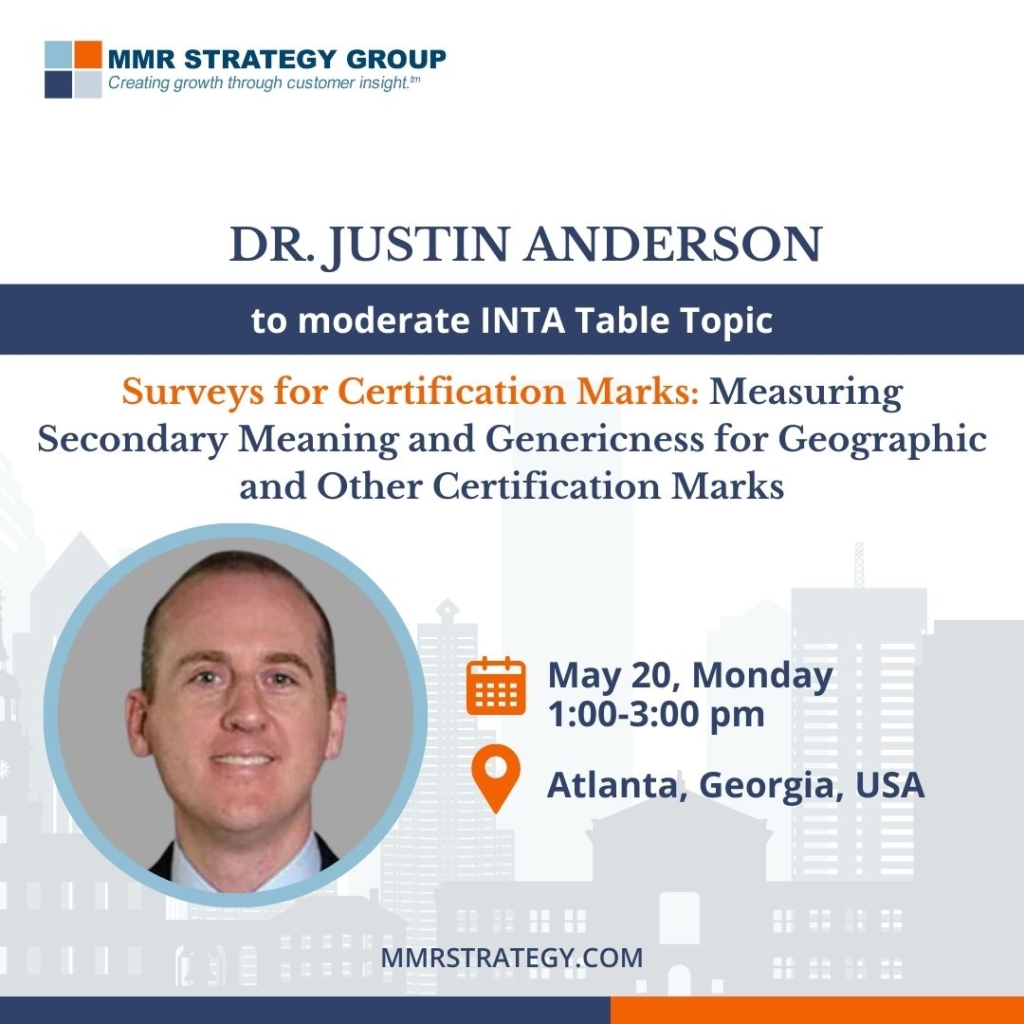Overview: Dr. Justin Anderson will lead a discussion of consumer surveys regarding certification marks at the International Trademark Association (INTA) Annual Meeting, which will be held May 18-22, 2024, in Atlanta. The discussion will focus on how secondary meaning and genericness surveys are used in trademark disputes involving certification marks.
Certification Marks and Meaning
Certification marks show that products meet certain standards with respect to their geographic origin, quality, or how they’re made. A trademark shows the origin of a product or service, but a certification mark shows the standards that the product or service meets. The United States Patent and Trademark offers an example: a vacuum cleaner has a trademark from its manufacturer, but may also have a certification mark, Energy Star, showing that the U.S. Environmental Protection Agency certifies that the vacuum meets certain energy efficiency standards. Manufacturers can apply to become affiliated with certain organizations that hold certification marks, and use them in their marketing and advertising communications to appeal to different market segments and target audiences.
Consumer Surveys and Certification Marks
As with all advertising, disputes may arise around brand adherence to certifications, objections to granting a certification mark, and what goods or services qualify to be certified with a mark. Consumer surveys can be used in these disputes to generate evidence about what a reasonable consumer could believe, based on marketing and advertising communications about the product or service. Two types of survey that may be useful for this purpose are genericness surveys and secondary meaning surveys.
Secondary Meaning Surveys in Certification Mark Disputes
When a significant portion of relevant consumers associates some aspect of a product–the color of the packaging, for example–with that product, that aspect is said to have acquired secondary meaning. A secondary meaning survey assesses whether there is secondary meaning by testing whether a “significant” or “substantial part” of the customer class associates that aspect of the product with a single source. In the case of a certification mark, the secondary meaning survey can test public beliefs about the certification mark–whether, for example, a certain name communicates the geographic origin of the product.
Such a survey was conducted in Luxco, Inc. V. Consejo Regulador del Tequila, A.C. This was a dispute about whether Consejo Regulator del Tequila (CRT), a private company authorized by the Mexican government to regulate and certify tequila in that country, could register the name “Tequila” in the United States as a certification mark for “spirits distilled from the blue tequilana weber variety of agave plant.” CRT proposed that to use the word “tequila” in sales, distribution, and marketing, manufacturers must be sure that their products are manufactured in Mexico from distilled spirits from the blue tequilana weber variety of agave plant, manufactured in Mexico according to Mexican regulations for tequila production, or contain such spirits. The opposer, Luxco, Inc., imports tequila but does not make it. Among other things, it argued that “tequila” was a generic term.
In the 2017 case before the Trademark Trial and Appeal Board of the U.S. Patent and Trademark Office, CRT offered as evidence a survey intended “to determine whether and to what extent the term TEQUILA on alcoholic beverages indicates to relevant consumers that the product is made in Mexico.” For each of several types of hard liquor, the survey asked whether the name of the liquor communicated to them what country it was made in. Respondents who said yes were asked what country, and then what made them say that. Of the tequila consumers, 62.9% said the name “tequila” did identify what country the liquor was made in, and 55.4% of all respondents said they believed the name “tequila” indicated that the liquor was made in Mexico.
The TTAB relied partly on the survey’s results when it dismissed Luxco’s genericness allegations. It also relied on some information in the CRT’s survey when identifying a flaw in the genericness survey offered by Luxco. To learn more, join the conversation at INTA with Dr. Justin Anderson.
Genericness Surveys in Certification Mark Disputes
When a majority of the relevant consumer population believes that a term or trade dress element indicates a type of product, as opposed to a product from a single source, that term or element is said to be generic. Genericness surveys, including those using the Teflon survey format, have been used in trademark disputes to measure whether consumers understand a name as a generic name or a brand name. Genericness surveys may also be used in disputes involving certification marks.
In Bluetooth SIG, Inc. v. FCA US LLC, FCA, the manufacturer of major auto brands such as Chrysler, Fiat, Jeep, and Dodge, used nonprofit organization Bluetooth SIG’s protected certification mark to advertise the Bluetooth compatibility of its in-car infotainment systems. In support of its position that Bluetooth is understood by the public as a generic term, FCA submitted a Teflon genericness survey. The results of that survey showed that 82% of consumers understood BLUETOOTH as a generic name. Bluetooth SIG challenged this survey, arguing that it failed to distinguish between certification marks and trademarks, but the court found that this was a feature of Teflon surveys that went to the weight of the survey evidence, not its admissibility. For more lessons from this case, join the INTA discussion led by Dr. Justin Anderson.
Conclusions on Consumer Surveys and Certification Marks
Certification marks inform consumers and protect the significance of certain geographic, manufacture, or other indications of origin and quality. If you are involved in a dispute regarding certification marks or would like more information on how MMR Strategy Group conducts consumer research, contact MMR Strategy Group.
